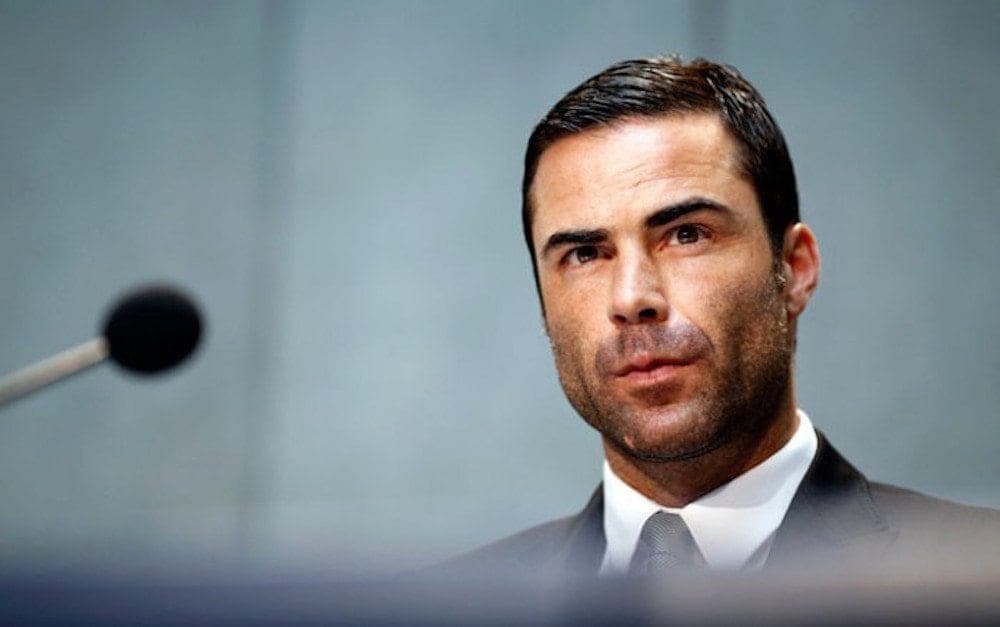ROME – While Pope Francis enjoys himself on the island nation of Malta this weekend, some rather uncertain, and potentially unpleasant, business awaits the pontiff upon his return to Rome in the form of the Vatican’s ongoing “Trial of the Century.”
The highlight of the coming week no doubt will come on Thursday, April 7, when Italian Cardinal Angelo Becciu once again takes the stand, this time to testify about his relationship with the so-called “Cardinal’s Dame,” a sort of humanitarian 007 (self-described as a humanitarian security consultant) named Cecilia Marogna, who worked closely with Becciu when he was the sostituto, or papal chief of staff. Becciu had refused to discuss his links with Marogna, citing pontifical secrecy, but Pope Francis has now issued an exemption allowing him to speak freely.
Given hints in the Italian press about something strange, possibly even salacious, in the Becciu-Marogna relationship, getting it out into the open on Thursday will be the most anticipated turn in the trial that focuses on a $400 million London property deal that went bad in 2018-2019.
This comes after testimony last week from Italian Monsignor Mauro Carlino, former secretary to both Becciu and his successor, Venezuelan Archbishop Edgar Peña Parra. Carlino’s presentation boiled down to a somewhat rambling version of the “I was only following orders” defense, suggesting that he never did anything wrong, and, if he did, it was unwitting and a product of following the instructions of his superiors.
(Carlino’s invocation of a time-honored phrase in the Secretariat of State, “Chi ubbidisce non fallisce” – “He who obeys, never fails” – says everything you’d ever want to know about a certain version of Vatican culture.)
However, one can make a strong case that the most consequential day of the week’s trial activity actually will happen on Tuesday, not Thursday, because that’s the day devoted to hearing from René Brülhart, former head of the Vatican’s Financial Information Authority, and Tomasso Di Ruzza, his top aide.
That’s because, from the beginning, the charges against Brülhart have struck many observers as the most inexplicable in the entire 10-person, three-organization indictment that began this trial, and thus, perhaps, they raise the most critical questions about the procedure’s integrity.
In effect, Brülhart is charged with abuse of office and with negligent supervision for failing to stop the London deal, which saw the Vatican lose tens of millions of Euros in what prosecutors charge was fraud, and defense attorneys insist was simply poor money management on the part of the Vatican’s senior leadership.
Two things about the charges seemed odd from the outset. First, AIF’s statutes never gave it any oversight authority whatsoever with regard to the Secretariat of State, so it’s not clear what Brülhart and Di Ruzza are supposed to have failed to supervise. The charge appears to be that they somehow connived with the Secretariat of State to create false justifications for payments in the London deal, but the thing is, those payments were fully approved by the highest authorities in the system, and it’s not clear how AIF could have affected things one way or the other.
Moreover, it was always odd to see Brülhart in the dock, given his otherwise sterling international reputation as an anti-money laundering expert and leader of the press for financial best practices. For years, Brülhart’s mere presence in the Vatican gave the whole reform effort an air of seriousness; to see him now characterized as part of the problem, therefore, was a bit jarring.
All this has given rise to speculation that perhaps the roots of the charges against Brülhart are to be found in personal animus rather than legal logic.
It’s well known that the chief prosecutor in the Vatican trial, veteran Italian lawyer Gian Piero Milano, has not exactly smiled upon Brülhart ever since evaluators for MONEYVALL, the Council of Europe’s anti-money laundering watchdog group, praised AIF’s reporting of suspicious transactions but slammed the Promoter of Justice for failing to follow up by launching prosecutions and bringing cases to trial.
According to this line of thinking, going after Brülhart and Di Ruzza as part of a complex set of indictments – maybe hoping no one would really notice against the backdrop of the other personalities involved – is more about payback than anything else.
Of course, it’s entirely possible that prosecutors have some piece of compelling evidence that suggests complicity, though it’s hard to imagine something that hasn’t already surfaced in the roughly 20,000 pages of documentation in the case – much of it, by the way, poorly reproduced and, in some cases, virtually illegible.
If not, however, the take-away may be that prosecutors allowed personal grudges to cloud their judgment, which, in turn, could call into question the legitimacy of a trial in which the Vatican already has invested considerable resources, both financially and in terms of moral capital. This is supposed to be a demonstration of a new commitment to transparency and accountability, and perceptions of personal bias could tarnish that image.
Pope Francis might be well advised to enjoy his weekend getaway, therefore, because things don’t shape up as easy going upon his return.
Follow John Allen on Twitter: @JohnLAllenJr













